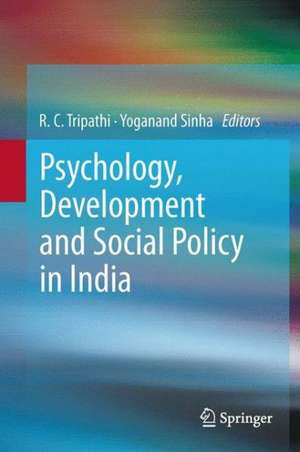Psychology, Development and Social Policy in India
Editat de R. C. Tripathi, Yoganand Sinhaen Limba Engleză Hardback – 19 aug 2013
| Toate formatele și edițiile | Preț | Express |
|---|---|---|
| Paperback (1) | 564.51 lei 38-44 zile | |
| Springer India – 23 aug 2015 | 564.51 lei 38-44 zile | |
| Hardback (1) | 575.18 lei 38-44 zile | |
| Springer India – 19 aug 2013 | 575.18 lei 38-44 zile |
Preț: 575.18 lei
Preț vechi: 718.98 lei
-20% Nou
Puncte Express: 863
Preț estimativ în valută:
110.06€ • 115.44$ • 91.62£
110.06€ • 115.44$ • 91.62£
Carte tipărită la comandă
Livrare economică 28 martie-03 aprilie
Preluare comenzi: 021 569.72.76
Specificații
ISBN-13: 9788132210023
ISBN-10: 8132210026
Pagini: 340
Ilustrații: XIX, 320 p.
Dimensiuni: 155 x 235 x 24 mm
Greutate: 0.65 kg
Ediția:2014
Editura: Springer India
Colecția Springer
Locul publicării:New Delhi, India
ISBN-10: 8132210026
Pagini: 340
Ilustrații: XIX, 320 p.
Dimensiuni: 155 x 235 x 24 mm
Greutate: 0.65 kg
Ediția:2014
Editura: Springer India
Colecția Springer
Locul publicării:New Delhi, India
Public țintă
ResearchCuprins
Chapter 1: Introduction: The Psychological Coordinates of Social Policy in India.- Chapter 2: Social Research and Public Policy.- Chapter 3: Psychology and National Development.- Chapter 4: Human Development: Concept and Strategy.- Chapter 5: Education: Path to Development and Happiness in Rural India?.- Chapter 6: Language Policy and Education: Towards Multilingual Education.- Chapter 7: Learning Disability: Issues and Concerns with Implications for Social Policy.- Chapter 8: Social Policy and Mental Health: The Case of India.- Chapter 9: Psychology and Physical Disability Policies.- Chapter 10: Relevance of Traditional Healing and Health Care Practices in India.- Chapter 11: Psychological Impact of Poverty and Socio-Cultural Disadvantage: Some Problems of Policy and Intervention Research.- Chapter 12: Research on Distributive Justice: Implications for Social Policy.- Chapter 13: The Hindu-Muslim Divide: Building Sustainable Bridges.- Chapter 14: Gender Role Transformation and its Implication for Culture and Policy.- Chapter 15: The Environment-Behaviour link: Challenges for Policy Makers.
Recenzii
“The present book by experts and practitioners in the field of psychology, who, with their work have transcended disciplinary bounds is a book long due. It presents a mirror to both the practitioners in psychology as well as the administrators and policy makers. … In the book, there are several chapters, which set the tone for discussions and dialogue on the core idea of well-being and the radiating arrows into different fields … .” (Shilpa Ashok Pandit, Psychological Studies, Vol. 60, 2015)
Notă biografică
R. C. Tripathi (PhD, Michigan) is former Professor in Psychology, University of Allahabad, India and former Director, G.B. Pant Social Science Institute, India. He has been on the boards of many apex higher education bodies in India, including the University Grants Commission and the Indian Council of Social Science Research. Among his publications are Expanding Horizons of Mind Science/s (with P.N. Tandon and N. Srinivasan); Norm Violation and Intergroup Relations (with R. DeRidder); and Psychology in Human and Social Development (with J.W. Berry and R.C. Mishra). He is the Editor of Psychology and Developing Societies, an international journal published by SAGE.
Yoganand Sinha is Associate Professor in Psychology, University of Allahabad, India and has been involved in the development and teaching of programmes of the psychology of social change and national development; and also of Human Resource Development and Management. He is an HR consultant and serves on the boards of HR firms. An avid bird photographer, he has recently published a book on birds at the Indian School of Business, Hyderabad.
Yoganand Sinha is Associate Professor in Psychology, University of Allahabad, India and has been involved in the development and teaching of programmes of the psychology of social change and national development; and also of Human Resource Development and Management. He is an HR consultant and serves on the boards of HR firms. An avid bird photographer, he has recently published a book on birds at the Indian School of Business, Hyderabad.
Textul de pe ultima copertă
This book examines how and where psychology can engage itself in the framing of social policies for national as well as human development in India. Although the role that psychological knowledge can play in informing social policy decisions has been discussed for a long time, psychologists by and large have had little role in framing policy decisions related to such important domains as education, health, social justice and social inclusion. Policy makers, not only in India, but more or less everywhere have focused on interventions at the macro level, which has led them to ignore the root causes of the problems lying at the micro level. However, with the more humanistic approaches now being followed by economists and other social scientists, the person in society is slowly taking centrestage. Micro-level variables like happiness, the wellbeing of individuals and the social relationships within which people define themselves are becoming important.
Therefore, this book discusses important psychological issues related to human development; particularly, health and education, social justice, social integration, environment and work organizations, besides focusing on some general issues relating to the logic of making social policies. It is a first-ever attempt in India to inform policy makers about how micro-variables can be a crucial factor to consider while framing social policies.
Therefore, this book discusses important psychological issues related to human development; particularly, health and education, social justice, social integration, environment and work organizations, besides focusing on some general issues relating to the logic of making social policies. It is a first-ever attempt in India to inform policy makers about how micro-variables can be a crucial factor to consider while framing social policies.
Caracteristici
This book is a first ever attempt in India to inform planners and others to look beyond macro-variables and toward micro-variables in the creation of social policies It shows how a psychological perspective can be instrumental in formulating social policy and therefore national development It includes discussions across a large spectrum, including micro-issues related to health and well-being, education, social justice, poverty, and the environment




















